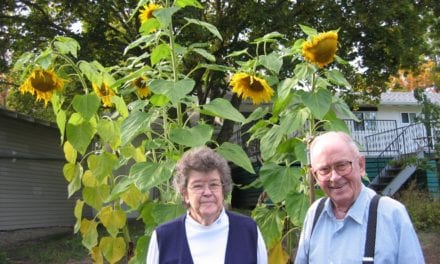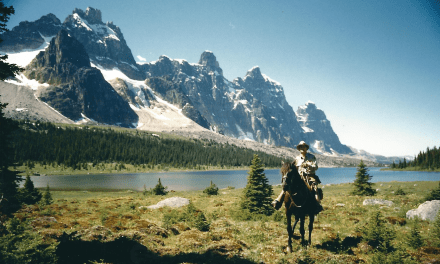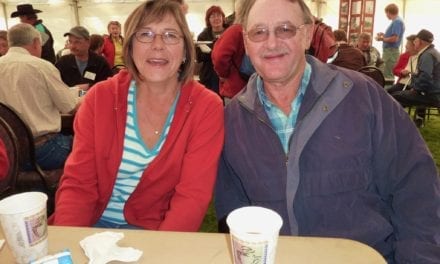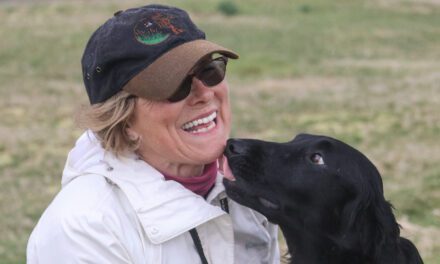• (1:45:13) Don – I would like to see it (the warden service) come back a bit the way it was. But…who knows? I think it was a really important part of our history for 100 years. I think that it is good for the younger people to know what it was like. All us guys who are now in their late 60s, early 70s came in during a real transition period. From living in backcountry districts to hiring wardens with more (formal) education…biology, wildlife, more scientific backgrounds. At first most of the science was done by specialists. Then the wardens started to take that role on. Some of us didn’t have that background, but we got trained on the job. Some people excelled at one thing or another. A lot of the people that were hired in the 1970s and the 1980s especially had that background. They had gone to university and taken wildlife studies for example, guys like Terry Skjonsberg and Mike Gibeau. Those fellows were wardens yet they were also specialists in wildlife. Same with fisheries. That was what Charlie (Pacas) was doing, aquatics. Public safety also got more and more specialized as it went on to where they are hiring mountain guides…A bunch of us were, I guess you would say generalists, better at one thing than another, but we were all part of a team. Backup for public safety if there was a search or a big thing going on like an avalanche, we would all get involved. We all had the background, but there were guys that you couldn’t keep off a mountain anyway that were doing that work every day!
• (1:47:24) Grace – I found too that for most people the warden service was something that they deeply cared about and that I think was where all the team spirit came from.
• (1:47:36) Don – Yeah… pretty passionate about parks and keeping them traditional. We still get worked up about the overdevelopment that happens…things like the thing (Skywalk) at the Columbia Ice Fields…even
though it is probably more environmental than having the wheels going over the glacier all the time with the big tracks…but at the same time you don’t like to see new things like that.
• (1:48:23) Grace – It was the whole park that you were involved with.
• (1:48:32) Don – We had a lot of good comradeship and we were always joking. Even when things were tough, we kept that humor up…playing tricks on each other and having fun while we were at it.
• (1:48:52) Grace- But you all had to depend on one another too, in terms of rescues and things like that. You had to believe in the ability of the other person doing their job…a lot of team work.
• (1:49:05) Don – People were willing to help each other learn things that they knew better. I did not have that feeling that there was a lot of competition. If somebody was really good at wildlife say, and how to handle a bear, you shared it with everybody. I always felt there was not a lot of jealously. I can still remember the old district system, they would criticize each other about who had the best trails (but, like family they would not let anyone outside the system say anything). I remember a story. Jim Rimmer and Joe Halstenson were in two different districts. Rimmer would say “That Halstenson, never cuts his trails. You’d never find a tree on any of my trails, I can tell you that much!” If an outsider said “Joe didn’t cut his trails.” Rimmer would say, “What do you mean? Are you telling me another warden didn’t cut their trails?” They would back each other up in their own way! They could criticize each other, that was okay. But no one else could…I thought it was kind of neat actually.
• (1:52:22) Don – Long before we were on the warden service, Keith Foster and I were trailing horses through from the North Saskatchewan River…actually all the way from close to Nordegg. We had a hunting trip up there and we trailed them all the way down to the White Rabbit and up the White Rabbit and over into the park. We did it in two days. We got to Indianhead at dark. Jim Rimmer was in there. We came in with all these horses. We went in and you could tell that he didn’t really want us there. But he said, “Well, I suppose you boys are hungry, I guess that I could cook you up a spud.” That’s what he did! He cut a potato in slices and put it in the frying pan and gave us each a half of a potato! Then he said, “Well it is past my bedtime, you boys better be on your way.” It was pitch dark. We were trying to follow a white horse through the bush down to the river. We got to the river and it was about another ten miles before we could get out into the open. We got out in the open and caught our pack horses in the dark and rolled out our sleeping bags. It snowed that night and there was about a foot of snow on top of our sleeping bags. It was snowing so hard that we couldn’t even see our horses! We wandered through the snow until we heard a bell. We caught some of them and made it out to the Ya Ha Tinda and the Red Deer river where their winter pasture was…
• (1:54:13) Grace – Find out where the horse is! (In response to the question “Is there anything I haven’t asked about that I should?”)
• (1:54:18) Don – Yeah, the story of the wooden horse…We had it in Yoho last. We had some funny stories about that. It started I think when Andy built the first horse to take to the Pallisades or someplace like that to show people horse packing. He had little pack boxes and a little tarp and pack rope. I think that it started back then, I don’t know totally, but I think that they took it off one of these schools and took it to Riding Mountain or someplace like that. Then they put their brand from a different park on this tarp. Somebody else stole it back and left a little pile of horse poop there instead! It got to be quite a thing you know. We had it in Yoho…once Kathy and I got it.
• (1:55:52) Grace – What I was thinking was with Dorothy Carleton when Ed retired. We stayed at the Banff Springs Hotel. Kathy and Dale did too and there was a raid. They went into people’s rooms to look for the horse! We came into our room and someone had been there looking for the horse…
• (1:56:08) Don – That was when Banff got it. They ended up with it. I think they were going to give it to Andy.
• (1:56:14) Grace – Maybe your dad (Keith) had it!
• (1:56:15) Don – They were going to give it to Andy as a retirement present, just kind of as a joke. Somebody heard about it and they ripped it off. Then it ended up at somebody else’s retirement. It was up in the rafters at Warner’s barn. I wasn’t there. I think Tim Auger was climbing across the rafters to get it somehow and they had a big fight over it and broke its leg. Anyway, they somehow got it.
• (1:56:49) We got it from Yoho twice and Lake Louise had it. I think it was the time at Andy’s retirement that Lake Louise had it. They had it hidden up in the equipment building out by the compound. The old equipment building had a sharp roof and there were lockers….and it was in behind the lockers. But what happened was at the yuka party! Dale was working at Lake Louise and Kathy stole his keys. Kathy and Randy and I went over to Lake Louise. We got into the warden office; it was the old school. Now it is the house that they have at the ranch, at the Banff corrals. There was a big window so we were crawling on our hands and knees. We looked through everything and we couldn’t find it. We went to the equipment building and crawled around and then we went upstairs and pulled open one of these lockers out from the wall and there it was sitting. So we stole it! My cousin Lynn made ceramics. She made this stupid looking ceramic frog with a stupid look on its face. So, we left that in its place! We stole the horse and we had it in Yoho. We kept hinting to Dale because they never looked at the horse and never missed it. Finally, we hinted enough. I think he was in charge of the front country and he told Dave Norcross or somebody to go and check it out and there was this frog there! They took it down to the office and Dale Loewen was there and he threw it into the garbage and broke it all to pieces. He used to go out with my cousin Lynn! Anyhow we had it then and somehow, they got it back…I can’t remember the story. The next time (the pack horse appeared) it was at Earl Skjonsberg’s retirement. I wasn’t at it. They had it in the Banff Park Lodge. It was Kathy who pulled that one…I can’t remember who had it, but they had it in their room. It seems to me it was a chief warden…She went into their room and pretended that she was the mother. There was a babysitter there to look after the kids…the babysitter hadn’t met the mother, “Just thought that I had better check on the kids.” She goes in and here is the horse in the bathtub and she got it! Then we had it back in Yoho again and I remember it was in the fire equipment building, in behind all the pumps and stuff down at the ranch. That was 1980 or something. It disappeared and nobody has seen it since.
• (2:00:22) Grace – I was just thinking that I really loved that touching moment …a train had killed a mother goat and the baby goat had survived. Then they put it in the horse trailer and took it and eventually found another goat family for it to be with so that it would survive…I thought that was really nice… (In response to the question, “Do you have any lasting memories as a warden’s wife?”)
• Part Two- Speaking about some of the characters in the warden service – (0:00:00) Grace – Allan Knowles, he looked after Lake O’Hara in the 1970s. And some girl was bathing in the creek. He was a real gentleman…
• (0:00:09) Don –Allan Knowles, yeah that was funny! Allan had a stutter, but he was one of these guys who never had a hair out place. He was really good. He worked under me, I was in charge of the south side there and he was the O’Hara warden for 20 years in the summer. He was very by the book. He wrote lots of tickets. Every day he would walk at least 20 miles, this whole circuit of O’Hara. Then he would come home and have a sparse supper. Water and something else. Then he would go out at night and walk out to the Schaffer Meadows and to the Alpine Hut. One evening he was walking out by the Alpine Hut and there was this nude girl washing in the stream! He walked up to her and said “You can pollute the stream.” She said, “Oh really?” She wasn’t the least bit embarrassed! She just grinned at him. He always wrote everything down in really fine letters so that he wouldn’t use too much paper. I would always need a magnifying glass to read it! He was telling me this story after I read his report. He said, “I walked up to her. I didn’t charge her though – and she had a lovely body.”
• (0:01:39) Grace – He was an engineer the rest of year in Vancouver.
• (0:01:43) Don – He was a quiet guy. He was very lonely in a way, but you could set your clock by him. He worked for MacMillan Bloedel. He had a really high paying job…in the office. Before, he worked there he worked in Yoho when they were building the highway, around 1959, the TransCanada. He had a job there as a young guy and he went up to O’Hara and he loved it. He worked for MacMillan Bloedel and worked himself up…He got on the warden service and his goal was …to go back to O’Hara. He was a seasonal warden in Banff for a year and he was in the backcountry. It was 1976 and he wanted to come to Yoho and Hal was the chief warden. He was one of the only guys with an education when he got on. Anyway, Hal said, “If you work one summer being a duty warden…then the next year you can go to O’Hara.” Well that summer Allan would go down the highway and he would come into the office with a handful of tickets. We joked that he would charge people for picking dandelions! Hal was just beaming! “That’s what you guys should do! Look at this, look at this!” Showing us Al’s tickets. He said to Dale and I, “If you two saw my grandmother being raped in the ditch you would drive on by!” That was what he thought of our law enforcement!
• (0:03:41) Grace – But Al was such a soft-spoken person.
• (0:03:45) Don – Yeah, a real gentleman you know…He was in good shape, his knees finally went on him. I can remember one time him and I decided that we were going to hike from O’Hara over to Dennis Pass into Field. We got up the pass fine, but it was a long day. Then we got to the top and we lost the trail, it was a jungle. We were in creeks and falling over rocks. I remember Al was trying to get down this one place and he fell over a bank. He did a summersault and landed in the gravel. Our house was near the end of the trail. We came out at Field and Allan stopped behind me. I came staggering out and my clothes were ripped and my hair was a mess. Allan came five minutes later like he was out for a Sunday walk, not a hair out of place!
• (0:04:44) Grace – He just had a love of the park.
• (0:04:46) Don – He just loved O’Hara. Ford sold it (Lake O’Hara lodge) when the Laub’s bought it. I was up hiking with Allan the next summer. He said, “I wish I had known that this place was for sale. I’d have bought it and turned it back to Parks.” Alan was just so dedicated. The Laub family would always invite him over for dinner but he wouldn’t go. He’d use their shower. But he wouldn’t go for dinner because he wanted to keep at arm’s length with the owners. He would check the sewage plant and any outflow. There were crystal caves at the end of Lake O’Hara. They were bricked off but there are still little bits of crystal on the ground. Alan was up on the ridge watching with binoculars to watch people going to the caves. He went all the way down and was standing there when they came out. “Could you please open your pack?” The guy did and Allan charged him for collecting the little crystals.




Very cool, I am currently in my 5th year working at skoki, as the hauler, a lodge attendant and as a landscape artist, I have just tried to do a deep dive of a June mickle painting I have found in the managers cabin from 1954 of Baker lake and packers peak! If you guys have any info on it or any directions to point me that would be wonderful